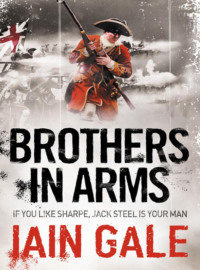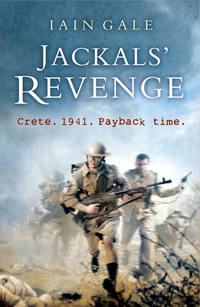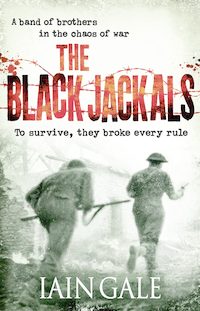
Полная версия
Four Days in June
The Prussians waited, behind the limited cover of their defensive position. On Blü cher’s orders, Ziethen had drawn up his I Corps, the front line of the Prussian army, in a long ‘S’ shape, ranged 10 kilometres in a string of hamlets which ran along the course of a stream, the Ligne. It was a good defensive feature; its pleasant banks – lined with willows, alders and brambles – were naturally marshy and would be impassable to infantry under fire. The French would be channelled on to the four bridges across the Ligne. Forced into bottlenecks, which, if the Prussians used their time carefully, raking them with cannon and musket fire, would soon become crammed with enemy dead and dying.
On the right, in the houses of Wagnelée, La Haye and St Amand, Ziethen had placed Steinmetz’s dependable Brandenburgers and Westphalians and Jagow’s crack 29th Infantry. In the centre, around Ligny itself, the largest of the villages with two farms, a church and a walled cemetery, and in Potriaux and Tongrinnelle, stood Henckel’s 19th Regiment and the remainder of Jagow’s men. Here also was Krafft’s brigade, detached from II Corps. The left flank and the farming settlements of Boignée, Balatre and Bothey were held by Carl von Thielemann’s III Corps. The reserve cavalry, Uhlan and Landwher lancers mostly, Blü cher had positioned in a hollow behind Ligny. Pirch’s brigade stood just behind the commanders, on the heights of Brye.
The second line of II Corps had arrived at midday and fallen into its pre-ordained supporting position on the forward slope of the high ground along the Nivelles road, centred on Sombreffe. In all Blücher’s men numbered around 84,000. Yet, as Ziethen was well aware, they were barely enough for such an extended front. This was nevertheless the plan which had been prepared and agreed upon by the General Staff a month ago. And as such it must be adhered to. Their precise positions, though, thought Ziethen, were not as had been prescribed – on a north – south axis. Napoleon’s direction of attack had forced them to wheel ninety degrees, with their forward positions now taking the form of a vulnerable salient. It was far from ideal.
As much had been evident two hours ago to Wellington, who had ridden into the camp with a small escort of his staff, and gone largely unrecognized by the majority of the Prussian soldiers. The Duke had been greeted by Colonel Hardinge, an amiable officer of the English Guards, attached to Blü cher’s staff, whom Zeithen had come to know and admire over the past few days. Taken by Hardinge to Blücher, Wellington had climbed with him, and Gneisenau, Ziethen and von Reiche, to the top of the windmill that stood high above the village, affording a wide view of the plateau below. The Prussian commander was unsettled. Ziethen knew that he had a recurring problem with his back. He had been on horseback since dawn and would doubtless be in a bad mood. He was clearly beginning to feel his seventy years. And Ziethen had also noticed an alarming stiffness in his commander’s legs as they had climbed to the top of the mill earlier that morning.
Back at their makeshift observatory, they had stood in silence as, revealing nothing, Wellington surveyed the positions. Ziethen had met the hero of Vitoria only once before, last year, in Vienna. He admired his composure. With such coolness he might almost have been a Prussian officer rather than an Englishman. It was this, perhaps, along with the value of his word and his effect on the morale of troops on a battlefield, which he knew Blücher most valued. Gneisenau of course was another matter. Had it been up to him, the Prussians would not now be acting in concord with the English, but would have waited for the promised Austrian army to arrive. But that, they all knew, would have been too late. And so, reluctantly, the Chief of Staff had bowed to the wishes of the Field Marshal. This morning he stood at a little distance from the rest of the party, absorbed, apparently in his own observations.
At one point von Reiche had become excited, spotting on an opposite slope a group of French officers, with among their glittering finery a little man in a drab grey coat. He’d turned to Gneisenau: ‘Bonaparte, your Highness. It’s Bonaparte.’
The Chief of Staff had put a field-glass to his eye. Even Blücher had looked. The Duke alone had continued his inspection in silence, before at length turning to Blü cher. Why, he asked, had he not made use of the reverse slope? Surely the Prussian reserves would take a pounding from the French guns? Ziethen had relished the Field Marshal’s reply: ‘My men like to see their enemy.’
At length, as they were about to descend from the tower, Gneisenau, ever distrustful, had asked the Duke if he would send at least a division as quickly as possible along the Namur road, towards the Prussian lines. Again Wellington had remained silent. And then, pretending to ignore the request, had spent some time with Hardinge, poring over Blü cher’s maps. Nevertheless, before riding off, he had finally offered his assurances that he would come to their aid – providing of course that he was not attacked himself. A conditional promise. Better than none, thought Ziethen. Although within the hour he had cause to doubt his conclusion.
The first great attack had come in three huge, extended columns, each with a cloud of skirmishers in front, which had smashed their way, without waiting for a covering cannonade, through the four-foot high corn towards St Amand and Jagow’s 29th Infantry. The Prussian artillery had done dreadful work among the French, scything into their ranks. And still they came on. Once at the village Jagow’s 2,000 men had poured volley after close-range volley into the front ranks. Yet still they came. It had taken no more than fifteen minutes for the French to drive the beleaguered 29th out of St Amand. This success seemed to be the signal for a wider attack, as the other villages came under a withering fire from, he estimated, at least 100 French cannon. In La Haye, Steinmetz had attempted a counter-attack and moved his brigade reserves against St Amand to bolster the decimated but unbroken 29th.
Where, though, was Wellington? Perhaps, he thought, Gneisenau’s fears were not groundless. About one thing, however, the Duke had been right. The French artillery had been raking the reserve lines for almost an hour. Firing high over the heads of the front line, their ricocheting cannonballs had taken a terrible toll of II Corps. Surely the English would hear that? Surely they must march to the guns? Quietly, Ziethen cursed Gneisenau for his damnable ability to be right.
A roundshot, whistling a little too close over his head, en route for the reserve, brought Ziethen back to the present. Peering ahead, into the valley, he could see, across the entire front, dense columns of French pressing home their attack. Reports were coming in from all sides.
A messenger rode up. One of Jagow’s aides, sent from the bloodbath at Ligny.
‘Herr General, Major-General Jagow begs to inform you that he is facing renewed attacks. He estimates over 10,000 French infantry. He requests reinforcements, sir, but asks me to inform you that he will hold till the last man. He is even now exhorting his men to die for the Fatherland.’
‘Tell him I can promise nothing. I have no more troops in reserve and the whole of II Corps is under heavy fire and unable to manoeuvre. No. Wait. Tell the general. Tell him that something … someone … some men will be with him soon. Tell him to hold on.’
Another rider. This time from Steinmetz. He recognized him. Captain Werner. His face black with gunpowder. A sword cut across his chin.
‘Herr General. Major-General Steinmetz begs to inform you that he has taken more than 2,000 casualties and has been forced out of the village, sir. St Amand is lost. He requests further orders, sir. Shall we counter-attack?’
Ziethen thought for a moment.
‘No, Werner. Tell the general to regroup. To form up before the village. To consolidate whatever remains of his brigade. Tell him that I’m coming. That I’m bringing reserves. Tell him to wait for my arrival. Understand?’
With St Amand gone, their right flank and with it their link with Wellington would be seriously threatened. This had not been part of the master plan. Incredibly, although they must outnumber Napoleon by 10,000 men, they were losing the battle. Ziethen was haunted by memories of Jena. Disgrace. Humiliation. But this was a different army. It was also different, though, from that which had crushed Bonaparte at Leipzig. It was hard to believe how quickly last year the General Staff in their wisdom had disbanded that army. Hard too to credit the short time it had taken to assemble the one now suffering so badly. Young and green, it had been well drilled and disciplined to react like the modern army it must be. But it was still an army constituted for the most part from conscripts and militia. He only hoped that what it lacked in experience it could make up in determination. So far, at least, it seemed to be holding.
Riding around the base of the windmill, Ziethen searched for Blü cher, but found only Gneisenau. Surly. Frowning. A cannonball had cut his horse from under him. He rounded on Ziethen.
‘Well, my dear count. What of this? You will no doubt recall that I advised you that we should not stand here. That we should retire on Liège. Tell me, General von Ziethen, where do you suppose, at this moment, is the Duke of Wellington?’
Ziethen did not rise to the bait, but remained set on the matter in hand.
‘Sir, I must find Marshal Blü cher. We must reinforce the right flank. Both St Amand and La Haye have fallen. We must retake the villages. If we do not we are lost. Our flank will be turned.’
‘Prince Blü cher is down in the valley.’ He gestured towards Ligny. ‘He is doing what he does best. Inspiring men to fight for their country. I am in command.’
‘Then, your Highness, you must decide. Have I your permission to send in a brigade of II Corps?’
‘Count von Ziethen, you are aware that I do not believe that Wellington will come to our aid. But you and I must agree that there is no point in our sacrificing the army. We cannot afford to risk being taken in the flank. Yes, the villages must be retaken. Do what you have to.’
Ziethen called an aide. ‘Send this to II Corps.
‘To Herr General von Tippelskirch, 5th Infantry Brigade. By order of Count von Gneisenau, you will advance to the outskirts of the village of St Amand where you will reinforce General von Steinmetz. You will take the village and hold the position at all costs. Cavalry will be in support.’
As Werner rode off to deliver the order, Ziethen looked again across the valley. Clouds of dense white smoke enveloped the battlefield, along the length of the stream. As ever more wounded emerged dazed and bloody from its depths, so further reinforcements were pressed forward out of sight, to plug the new gaps in the line.
Howitzer shells were falling in the villages, in Ligny in particular, setting houses on fire. In the few brief lulls in the firing, Ziethen could hear the frenzied screams of the wounded trapped inside. He imagined them – boys mostly, dying so horribly in their first, their only battle.
Another rider delivered a hand-written note from General Henckel. There was hand-to-hand fighting in the streets of Ligny. Every lane, even the gardens, was choked with the dead. And all the time it seemed that, inch by inch, the French were gaining ground. In the fields behind him, the greater part of II Corps stood in its positions on the forward slope, pinned down by the French artillery. Unable to reinforce the line.
For an instant the smoke grew less dense and, noticing a gap, Ziethen rode 100 yards forward down the slope and put a telescope to his eye. Bizarrely, he was able see quite clearly. Down in Ligny a brigade of French infantry was moving in to the attack. He saw them break into a charge, some of them peeling away down a hollow track across which Jagow’s men had dropped felled trees, farm machinery, furniture, pews from the church. Faced by this tangle, the French came to a halt. For a moment. Then the press from behind, the sheer weight of numbers, began to push the front ranks forward, crushing them against the makeshift barricades, moving them by force of human bodies. Trampling over their own men, they reached the church. Without warning, as Ziethen continued to stare, from behind the walls of the churchyard, from the cover of tombstones and from windows, Jagow’s infantry opened up. Perhaps twenty score of French fell at once. He took the telescope away. Wiped the dusty lens, looked again. Saw yet another French column rush into the town and towards the church. This time they were met with bayonets.
Ziethen gazed in unconcealed horror at the ferocity of the fighting. Men were firing into each other at close range. Blowing off pieces of their adversaries. Leaving smouldering black powder marks around the wounds. He saw French and Prussians alike fall by the score. Saw, quite clearly, a young Prussian grenadier use the butt of his musket to beat out the brains of a voltigeur before he too was cut down by the slashing sword of a French officer. Who in turn was shot point-blank through the mouth. A sergeant of chasseurs was beating the bloody head of an already dead Jäger rifleman against the wall of the burning church. Never, in twenty years of soldiering, could Ziethen remember witnessing such basic, primeval violence.
For a moment the French appeared to falter. And then another officer, a full colonel, rode up and rallied them and, although he could hear nothing above the din of battle, Ziethen could see the blue-coated infantry shouting, mouthing oaths to the glory of their Emperor, before they disappeared into the madness of the mêlée.
Drained, he dropped the glass from his eye. Stared in silence. If they continued to fight like this, surely the French would win against any odds. Gneisenau must commit the entire reserve. Bring them down now, never mind the cannon fire. Ziethen raised his telescope again. Swung it round to the left of Ligny and across the stream. A glint of brass caught his eye. Cannon barrel.
He called to von Reiche. ‘Do you see that?’
There was no question about it. Artillery. He counted more than ten batteries. Heavy guns manned by men in peaked bearskins, being moved up towards Ligny. Bonaparte intended to reduce the village to rubble. And after that he would be free to swing those twelve-pounders around and enfilade either wing of the Prussian army.
All they could hope for now, it seemed, was to hold out until nightfall brought an end to the fighting. Then perhaps the survivors might join with the English tomorrow.
In the sky the storm clouds were gathering, steadily growing heavier. Where in God’s name, he wondered, was Wellington? And then, remembering his promise to Jagow, Ziethen set off, back up the hill, in search of the reinforcements.
NINE
Quatre-Bras, 3.45 p.m. Ney
He sat on Mortier’s old horse, in the centre of the line, by the wood behind the little whitewashed farm, and stared at the pall of white smoke rising from the crossroads. Ney knew that he must work to calm himself. Wasn’t Aglaé always telling him so? He must control his temper. But, he reasoned, General Bachelu had been asking for it. Of course it was true that the high crops might conceal more of the enemy. There were always hidden dangers in battle. So why, he had asked him, had Bachelu ever become a soldier? Was he afraid? Ney had to admit it was a bit severe. More than that, it was unfair. Unjust. Ney bit his lip. Knew that the only reason he had treated the general so badly had been his own frustration. His orders from the Emperor had only arrived late in the morning, delivered in person by Charles de Flahaut. It was good to see the handsome young general. A reminder of happier times. Flahaut was the lover of Hortense de Beauharnais, the Emperor’s stepdaughter, and had been Aglaé’s favourite singing partner in so many concerts at their Paris home. Ney had always been a little jealous.
It was a short message. Ney was to engage the English at once. Take the crossroads. But it had not taken him long to realize that, if he were to safeguard his flank, Bossu wood must also be secured. A frontal assault on the wood? Reille advised caution. Instead, Ney had decided to attack the Allied left. To make for the Namur/Nivelles road and to take it at the hamlet of Paradis. That done, he calculated, the Dutch would be forced to abandon the big wood to save their own flank. There would not be, as the Emperor had demanded, some daring coup de main. The only way to beat Wellington at this game, Ney knew, was to muster his men and simply press the Allies into the ground by weight of numbers. A mass attack in the old style. Of course the French would take casualties. But d’Erlon’s corps would be here soon to exploit the gap, and after that the way to Brussels would lie open. It was a brilliant plan. Worthy of the Emperor.
It had, however, taken the remainder of the morning to manoeuvre into position. Twenty thousand men had moved from column of route to column of division and finally into column of attack. Twenty-four battalions, each of them with a frontage of sixty men and nine ranks deep. At length, it was not until 2 o’clock, far later than Ney had originally intended, that he had sent them in.
Bachelu needn’t have worried. His division had simply walked through the handful of Dutch skirmishers. A thirty-gun cannonade had knocked out one Dutch battery in spectacular fashion, blowing up an ammunition caisson and sending men, parts of men and horses and shards of wood flying thirty feet into the air. True, Foy’s division over on the left had been harried by the remaining Dutch guns, but another barrage soon silenced them. Then Foy’s men had pushed into the edge of the wood, forcing back the Nassauers. Within an hour Ney had advanced 1,000 yards. On cue, Jerome’s division had arrived.
Looking through a field-glass at the crossroads, Ney had also noted the arrival among the Dutch of fresh, green-coated troops. More Nassauers. Running, curiously, into position. It was of no consequence. What was important was to take the crossroads before Wellington was able to deploy his English.
The central farm, Gemioncourt, was held in force. Ney moved quickly. Sent in four of Foy’s regiments to the assault, supported by Piré’s lancers. As they moved relentlessly forward, a rider approached the marshal from the direction of Paradis. A dust-covered captain of infantry.
‘Captain Letort, sire, of the 3rd Line. From Colonel Baron Vautrin. I have urgent news. The English, sire. They’re on the road. At Paradis and at the crossroads.’
‘Impossible, Captain. I can see no redcoats. Where are they?’ Ney peered through his telescope.
‘Not redcoats, sire. Riflemen. And believe me, they’re there. In the Bois de Cherris.’
Of course. Those running, green-coated infantry who had reinforced the Dutch skirmishers. Not Nassauers at all, but English riflemen. Raising his glass again, Ney tried to make them out, but the smoke was now too dense. He swung the telescope round to his left and instantly knew the report to be right. There in the middle distance, behind the thin hedge which flanked the road, was a line of red. Redcoats, their black shakos ranged in four ranks, under fluttering regimental colours – one dark blue, the other the cross of the British Union flag. Beyond them he saw others. Men in skirts. Highlanders.
Now Ney began to sense the danger. Now at last he had to acknowledge that this was no Dutch provincial general facing him out there across this shallow valley. This was Wellington, the master of concealment. For all Bachelu’s fears, the cover of the crops did not concern him so much as what lay beyond. Who knew what troops the English commander had now behind the crossroads? This could be Bussaco again and, if he were to be honest, Ney knew that somewhere out of sight, probably on the slight reverse slope to his rear, Wellington was massing a considerable body of infantry.
He turned to Reille, sitting silently on his horse, a few paces behind him. ‘The English, Reille. Wellington. You remember Bussaco? No, no. Of course. You weren’t there.’
‘Sire.’
The general was quiet. But Ney remembered Bussaco. Foy too. Would never forget it. Five years ago. The early morning mist lifting over a wooded hillside. His own VI Corps advancing in two massive columns, into what he had assured them was a retreating enemy. Advancing under light cannon fire to the crest of the hill. And then the shock. The two English battalions that had appeared from nowhere, delivering volley after unforgiving volley into their ranks. Sending the survivors hurtling down the slope in panic. Coming after them with the bayonet. There had been riflemen there too. Short swords screwed to the barrels of their guns. By 8 a.m. it had all been over. After Bussaco nothing had been the same. Wellington.
‘You see, Reille.’ Ney was suddenly animated. ‘At this moment Wellington will be manoeuvring his men out of sight. Behind that slope. Well, we are wise to his game, Reille. And we still outnumber him.’
Even as he spoke a great cheer went up from the centre of the line. Foy’s men had taken Gemioncourt.
As they emerged into the open ground on the other side, however, Ney saw a mass of cavalry move across the field towards the right. Sky-blue hussar uniforms and what looked strangely like green-clad French chasseurs. Dutch cavalry. They spurred headlong into Foy’s emerging infantry, managing to ride many down before they were able to form rallying squares. Within minutes, though, he could discern on the left the distinctive helmets of their own lancers. They took the Dutch in the flank, causing havoc. Men pulled back on their horses, tried to run. Turned, only to meet more lancers behind them. The Dutch Hussars and light dragoons wheeled about in disorder. Tried to find a way out. And then they were all streaming back up the road, the lancers hard after them. He saw more Dutchmen fall. Taken not by lance but by musketry. Mistaken by the redcoats, he realized with grim amusement, as they had been at first by him, for French. Rollin rode up.
‘Sire. Prince Jerome has advanced into Bossu wood, on a line with the farm, sire, as you ordered.’
‘Good, Rollin. That’s fine. Fine. Any news of d’Erlon?’
‘None, sire. But we know that he has left Jumet.’
Ney grunted. Where was I Corps? Jumet? D’Erlon was not even at Gosselies. Still, despite the presence of the English, things were going well. Jerome it seemed had taken almost half of the wood without firing a shot. Was ready to attack. Ney rode towards the left of the line, trailing in his wake his string of officers. As he approached Bossu wood, scattered shots began to ring out from the Allied skirmish line. He ignored them. Until one caught his horse square in the neck. It crumpled beneath him, trapping a booted leg.
‘Rollin, Heymes. Get me out. Help me.’
The two aides dismounted and rushed to Ney. Pulled him from beneath the dying animal. A fresh horse was brought up, the second he had purchased from the stricken Mortier.
Winded, bruised, Ney paused briefly before mounting, then continued towards the wood. He must take Bossu wood. Take the wood and he would be able to turn Wellington’s flank.
‘What troops oppose us in the wood, Heymes? Do we know?’
‘As far as we can tell, sire, just the Belgians. We have seen only blue coats, sire. No red.’
What was Wellington playing at? He had positioned his veteran English units on his left flank, and left only the half-trained, skittish Dutch militia to defend this key position. Foolish. He had made a fundamental mistake. And Ney would make sure that it was fatal.
Reaching the flank of Jerome’s column he rode between the trees, his new horse nervously picking its way through the undergrowth. Reckless in the face of enemy skirmishers and much to the concern of the staff, he removed his hat and waved it in the air so that the men could see his face. His voice rang clear through the wood.







